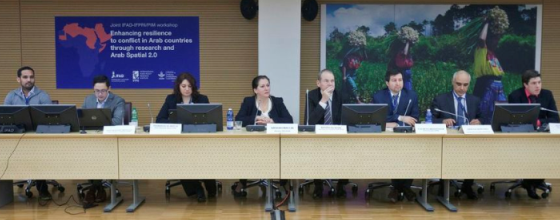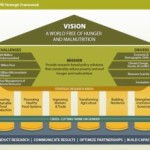Conflict and development research has in general neglected rural development and food security in the Arab world. To address this research gap, IFAD and IFPRI partnered in a three-year research project that recently culminated in a workshop titled, “Enhancing Resilience to conflict in Arab countries through research and Arab Spatial 2.0” in Rome on January 16, 2014. At the workshop, we presented our research findings and information tools that emphasize the key linkages between conflict, rural development, and food security in Arab countries and highlighted which policies and interventions may enhance resilience to conflict.
Food insecurity is a major (though not the only) cause of conflict in Arab countries, more so than in the rest of the world. Policies, programs, and projects that improve food security are therefore likely to also reduce conflict and enhance resilience to future conflict.
Those key messages are at the crux of our regional-level research and are discussed in greater detail in case studies from four countries in the region: Somalia, Sudan, Yemen and Egypt. Somalia and Sudan are countries that have been in conflict for many years, and Yemen and Egypt are examples of “complex emergencies”, i.e. countries that have experienced a series of economic shocks, which may have contributed to conflict.
Our research points to the similarities in the challenges that face Arab countries, however, it also attests to the heterogeneity present within the region, which is crucial to acknowledge when designing policy. For instance, in Somalia, drought fuels conflict through livestock price shocks; policies and investments for drought impact mitigation and resilience building are critical for both climate change adaptation and conflict prevention. For Sudan, warmer weather substantially increases the risk of local conflict; thus, resilience-building strategies and interventions need to be developed specifically for (agro)pastoral livelihoods, given the unique challenges associated with their (semi)nomadic lifestyle. Results on Yemen point to a close association between political instability and food insecurity; major policy reforms—including the implementation of the National Food Security Strategy—are necessary to bring Yemen back to pre-crisis achievements and move it further down a development path. Finally, for Egypt, increased poverty has resulted in an over-reliance on cheap and calorie-dense foods, including subsidized commodities, contributing to the “double burden” of malnutrition, the co-existence of underweight and obesity within the same population. Business as usual is not an option and improved targeting and complementary programs built within a broader national strategy of development and food security could reduce costs and improve food security.
Designing and implementing policies that build resilience to conflict requires high-quality data and information. Recognizing the scarcity of relevant data in the Arab World, together with our partners the International Fund for Agricultural Development, the CGIAR Research Program on Policies, Institutions, and Markets, and others, we developed and launched a policy information tool and open data repository on food security and development-related research in the Arab world: www.ArabSpatial.org. Arab Spatial houses over 200 indicators at the national, subnational, and pixel level over time that can be used for policy and planning purposes to display regional patterns and trends.
Enhancing resilience to conflict in Arab countries will be further explored during a parallel session at IFPRI’s upcoming 2020 Conference on “Building Resilience for Food and Nutrition Security” in Addis Ababa.
Read more about the regional research and case studies:
Beyond the Arab awakening: Policies and investments for poverty reduction and food security
Does food security matter for transition in Arab countries?
Extreme weather and civil war in Somalia.
Local warming and violent conflict in North and South Sudan.
Tackling Egypt’s rising food insecurity in a time of transition






